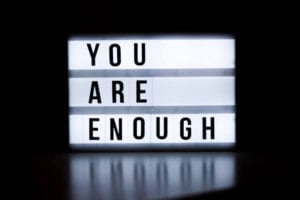WHAT IS CAREGIVER GUILT?
 I have yet to talk with anyone who has been tending to a loved one for very long who doesn’t feel guilty as a caregiver about how much they wish they could do, or for the negative emotions they hold, or for not making the patient ‘better.’ What is caregiver guilt, anyway?
I have yet to talk with anyone who has been tending to a loved one for very long who doesn’t feel guilty as a caregiver about how much they wish they could do, or for the negative emotions they hold, or for not making the patient ‘better.’ What is caregiver guilt, anyway?
When I cared for my father, who was dying from a brain tumor and no longer had access to language, I was awash with feeling guilt for all the ways I let him down.
I felt guilty for not recognizing his symptoms sooner. I just ‘knew’ he missed early treatment that would have saved his life, and I was to blame.
And I felt guilty for not being able to make him comfortable, for not understanding what he was trying to communicate, and for not being able to meet all his needs.
My list of reasons for feeling guilty as a caregiver is much longer, but you get the idea. I wonder if it was narcissistic of me to assume I had all these powers that I just wasn’t accessing? (Photo by Birmingham-Museums-Trust on Unsplash)
I know now that my ‘guilt’ was not narcissistic at all. I was living with shame.
Guilt is when we choose to do something wrong that we know about. It is appropriate to feel guilty for eating the food of a patient because we are hungry, or leaving him to shiver because we want the blanket for ourselves.
But the feeling of falling short—of ‘never enough’ —is not guilt.
‘Never enough’ is rooted in shame— a sense of basic unworthiness.
My shame was embedded in my sense of powerlessness. At that time, I was young and unaware of support systems that would have helped me accept my limitations without decimating my self-worth.
“Self-care is not selfish.
You cannot serve from an empty vessel.”
― Eleanor Brownn
FEELING SHAME AS A CAREGIVER
(Photo by Michael-Kilcoyne on Unsplash)
 With this burden of shame, I did not take excellent care of myself. Why would I make a priority of rest, good food, exercise, and sleep to keep me steady throughout the year my father lay dying?
With this burden of shame, I did not take excellent care of myself. Why would I make a priority of rest, good food, exercise, and sleep to keep me steady throughout the year my father lay dying?
I didn’t deserve it. Plus, I reasoned, I don’t have enough time to go to a gym or to sleep in! He needs me! I can’t afford to hire someone to help! He needs me. All of me.
Or so I thought.
My father had cared for me with his love, his resources, and his confidence in me.
It was years later before I realized that taking care of myself was one thing I could do to honor him for the caregiving he gave me for 33 years before he got sick.
I could ‘caregive’ myself as an act of solidarity with him, and with all other caregivers. I could give myself what he would have given to me if he were able.
In his name— in his memory— I live today with a priority of self-care for myself. I regret, though, that I didn’t make this a priority when he was sick.
I was trying to serve from the ’empty vessel’ that Eleanor Brownn refers to in the quote above. It felt like I was giving ‘all’ …but all of what? In the end, I paid a price for this both physically and emotionally. It’s little wonder I felt guilty as a caregiver and carried that feeling for many years.
HOW MUCH IS ENOUGH?
(Photo by Felicia-Buitenwerf on Unsplash)

I sometimes watch caregivers today sacrifice their joy and their health in the process of avoiding the ‘guilts’ for not doing ‘enough.’
If your loved one is a spouse, parent, dear friend, or sibling, I wonder how much ‘doing’ it would take to feel assured that you have done ‘enough’? What would it take to not feel guilt as a caregiver?
Finding ’enough’ from a soul filled with shame is like filling a bucket with no bottom.
It can’t ever be filled. How much of our doing is to meet some internal criterion of ‘enoughness’?
Is it ‘enough’ when we have given back what we have received?
Is ‘enough’ some point at which we can do no more?
Does our loved one’s response determine ‘enough’?
I wonder if the struggle of not feeling like we are ‘enough’ is because the vessel of our own life is draining faster than we can possibly fill it.
What would happen if we, as caregivers, fill our vessel with proper diet, rest, and exercise instead of trying to fill bottomless buckets with caregiving? I believe when we prioritize our own self-care, we will find resources we didn’t know we have.
Self-care doesn’t have to be expensive or time-consuming (the most frequent excuses for avoiding it). It relies mostly on our ability to claim our worthiness and respond to our own needs with the compassion we try to show another.
I have begun a list of ideas that will feed the soul, bless the body, and free the mind so that when we are engaged in caregiving we are pouring out from a full vessel.
10 STEPS TO SELF CARE FOR CAREGIVERS
 (Photo by 2ni-F2wL_ueRQ5I on Unsplash)
(Photo by 2ni-F2wL_ueRQ5I on Unsplash)
- Turn off the news. There is little to feed the soul in listening to the same story every day. It drains the heart and fans our fears.
- Journal. When caring for another person 24/7, there is very little time to see a therapist, but writing (or ranting or scribbling questions) in a journal can work miracles to relieve stress and gain insight.
- Organize old photos. Not only does memory for happy events increase oxytocin, but this may also be a pleasurable way to connect with someone whose language has failed.
- Hold hands while you look at photos…or while watching TV. We are built for human connection.
- Call a friend. Chatting with another human can ease a sense of isolation.
- Pet a dog. Or a cat. Fur therapy is priceless. You will always be enough for them!
- Write down three things every day that you are thankful for. Gratitude lifts our spirits.
- Listen to relaxing music – with headphones, if possible. It’s one way to ‘leave’ without leaving.
- Celebrate little wins – a ‘fist-pump’ when something, or anything, goes better than expected.
- Take a walk – even if it is only around your back yard. Time outdoors refreshes the spirit
THE IMPORTANCE OF ‘ME-TIME’
(Photo by Ryan-Christodoulou on Unsplash)
 Allow yourself to have ‘Me-Time’ to think or grieve, to draw or walk in the woods. It may involve time and space to lament what you are going through. (See ‘A Caregiver’s Guide to Lamentation’).
Allow yourself to have ‘Me-Time’ to think or grieve, to draw or walk in the woods. It may involve time and space to lament what you are going through. (See ‘A Caregiver’s Guide to Lamentation’).
Whoa…I can hear the chorus now: “There’s no time for me-time! Respite help costs too much! I am afraid.”
In the ballad of our caregiving, how about we sing this chorus instead?
“I will care for ME,
though I am afraid, alone, tired.
I WILL care for me.”
How we actually do that will be the subject for a later post. If you have questions or suggestions of what has worked for you, please share in the comments below.


Bonnie
Thank you. Helpful thoughts, a always. I have passed along your blog to my caregiving friends. Hugs – virtual, of course.
Ardis Mayo
Thank you, Bonnie. It is my prayer that these sorts of posts find the people who need them the most.
VickiJolene
Powerlessness. I tested up at that word and had to pause to read the rest. In this time of quarantine I find I must do the care I’m not trained to do and feel inept. Yet must suck it up and carryon and imperfectly provide nursing care. I imagine that I am not alone in this as we limit doctor visits and order supplies online.
Thank you Ardis. I’m off to put on my favorite music … and maybe allow myself a “Good Cry” which I would add to the list of healthy things to do. When I would cry as a little girl my mom would say “Ok that’s enough!” She had a short limit on how much crying was allowed. Now as a caregiver I say to myself “It’s Ok honey, just have a good cry and you’ll feel better.” so I do (apart from my husband) then wash my face and carry on!
Ardis Mayo
I am so glad, VickiJolene, that you added ‘a good cry’ the list. Absolutely! Tears wash out a lot of built-up grief. Thank you for sharing!